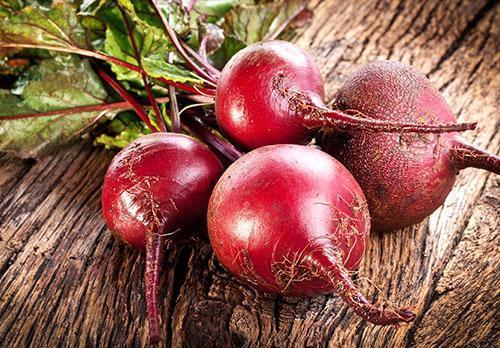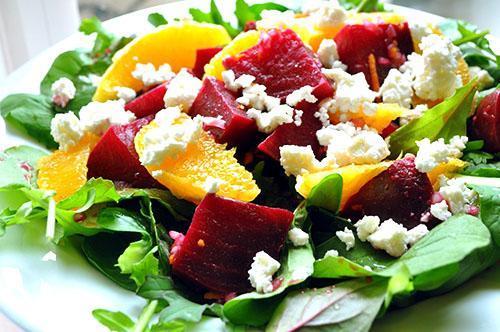Useful properties and contraindications for the use of red beets
 In the list of garden crops, beets are far from the last. This vegetable is unpretentious, perfectly stored and used in a variety of dishes. If the crops growing on our beds are ranked according to the degree of their usefulness, red beets will become the undisputed leader.
In the list of garden crops, beets are far from the last. This vegetable is unpretentious, perfectly stored and used in a variety of dishes. If the crops growing on our beds are ranked according to the degree of their usefulness, red beets will become the undisputed leader.
What are the benefits of beets for the body? What useful substances in its composition make it necessary to pay close attention to the vegetable and traditional medicine and medical specialists using traditional methods?
Read also the article: beet juice - benefits and harms!
The chemical composition of beets
Both the benefits and harms of red beets are determined by the presence of a large number of substances in root crops that affect human organs.

Per 100 grams raw red beet accounts for 42 kcal. Depending on the variety and growing conditions, root crops are capable of accumulating up to 14% of sugars, beets contain up to 1.5% proteins, a lot of dietary fiber and small amounts of fats and ash. At the same time, the burgundy pulp contains sufficient B vitamins, vitamins PP, C and K, which are essential for the body, as well as a long series of mineral salts. The main place among the macroelements is potassium, followed by iron, magnesium and sodium, manganese and iodine, zinc, phosphorus, rubidium, chlorine and such a rare element cesium.
Organic acids in the composition of red root vegetables are represented by oxalic, citric and malic acids, there are pectins and anthocyanins, flavonoids and amino acids in beets.
 What are the benefits of raw beets, and do their properties change after boiling or stewing? Since red beets are often eaten boiled or stewed, one cannot but mention the changes in the composition of the vegetable that occur as a result of heat treatment:
What are the benefits of raw beets, and do their properties change after boiling or stewing? Since red beets are often eaten boiled or stewed, one cannot but mention the changes in the composition of the vegetable that occur as a result of heat treatment:
- Beetroot loses some vitamins, especially ascorbic acid and some other compounds.
- The calorie content of the vegetable increases slightly, reaching 44 kcal.
- From 30 to 65, the glycemic index of boiled root crops increases, that is, after heat treatment, beets cause a rise in blood sugar levels twice as fast, which should be taken into account by diabetics.
Otherwise, the beneficial properties of boiled and raw beets are very close. What is the effect of a vegetable on the human body?
Red beets: benefits and harms
 Some of the beneficial properties of red beets and contraindications for their consumption can be attributed to most vegetable crops.
Some of the beneficial properties of red beets and contraindications for their consumption can be attributed to most vegetable crops.
Due to the abundance of indigestible fiber passing through the entire digestive tract, there is a serious stimulation of the intestinal motor function. As a result, the body is cleansed, metabolism and digestion are improved.
The B vitamins present in red beets actively influence the normalization of metabolism.
Dietary fiber inhibits the absorption of cholesterol, which, entering the bloodstream, can cause the development of atherosclerosis and other diseases of the heart and vascular system. This is useful for both raw beets and heat-treated beets.
The vitamin composition of root crops provides significant support to the immune system, which is especially important, given the good preservation of beets until spring, when vitamins are most needed.
Carbohydrates in beets can quickly replenish energy reserves and restore vigor to a person.
But there are useful properties of boiled beets and raw root vegetables that no other garden crop has:
- Due to the content of iron, copper and vitamin B1 in root crops, beets increase the level of hemoglobin.
- Eating beets helps stimulate brain activity.
- A vegetable, if consumed systemically and for a long time, has the ability to cleanse blood vessels from excess cholesterol, which reduces the risk of atherosclerosis, strengthens the capillary walls and has a positive effect on the state of the vascular walls.
 Red beets are good for the body:
Red beets are good for the body:
- in case of hypertension, with high blood pressure;
- as a mild natural diuretic and laxative;
- if there are risks of developing cancer;
- as a protective agent against the possibility of liver obesity;
- an effective antioxidant that prevents aging.
 With such a significant beneficial effect of red beets, raw roots sometimes act differently than boiled vegetables.
With such a significant beneficial effect of red beets, raw roots sometimes act differently than boiled vegetables.
What are the benefits of raw beets?
For the medicinal use of red beets and products from this vegetable, raw roots are often used.
 Indeed, in this case, beets completely retain all bioactive substances, vitamins and amino acids. In particular, the usefulness of raw beets is determined by the presence of betaine, which has a beneficial effect on:
Indeed, in this case, beets completely retain all bioactive substances, vitamins and amino acids. In particular, the usefulness of raw beets is determined by the presence of betaine, which has a beneficial effect on:
- on the performance of the liver and its health;
- metabolic processes;
- on the fight against heart disease and atherosclerosis;
- on the risk of developing Alzheimer's disease.
Raw roots are extremely active in the digestive system, cleansing the body of toxins and toxins. Beets are also useful for the body because they resist the development of neoplasms.
 It should be borne in mind that:
It should be borne in mind that:
- fiber in fresh root crops is almost twice as effective in adsorbing harmful substances and slags;
- raw beet juice is a powerful cleansing agent that requires careful use;
- all vitamins are preserved in a fresh vegetable;
- green tops of beets are useful for the body, like root crops, and can be used for food and for medicinal purposes;
- raw roots are less dangerous for diabetics.
Juices and salads are made with the addition carrots, pumpkin, fresh herbs.
Useful properties of boiled beets
 How is heat-treated beets useful for the body? First of all, it should be noted that after cooking or stewing, root crops do not lose very many useful substances. In addition to ascorbic acid and vitamins B5, B9, all trace elements, including phosphorus, copper, iodine and iron, potassium and sodium, are still active and ready to exert their effect.
How is heat-treated beets useful for the body? First of all, it should be noted that after cooking or stewing, root crops do not lose very many useful substances. In addition to ascorbic acid and vitamins B5, B9, all trace elements, including phosphorus, copper, iodine and iron, potassium and sodium, are still active and ready to exert their effect.
After cooking, some of the components are converted into a more accessible form and are easily absorbed by the body.
As a result of heat treatment, such a side effect of the action of beets as an irritating effect on the stomach and intestines disappears. For example, if in acute pancreatitis raw beets are strictly contraindicated precisely because of the possible exacerbation of the disease, then boiled root vegetables during periods of remission can be used as food.
It is important to remember that the beneficial properties of boiled beets will be preserved to the greatest extent if the roots are boiled without removing the skin. In addition, during cooking, most of the nitrates that this vegetable can accumulate during growth breaks down and passes into water.
Contraindications to eating beets
 The use of burgundy root crops not only for medicinal purposes, but also as part of familiar dishes does not always bring benefits, red beets are harmful for a number of diseases, as well as in the presence of an allergic reaction to the vegetable.
The use of burgundy root crops not only for medicinal purposes, but also as part of familiar dishes does not always bring benefits, red beets are harmful for a number of diseases, as well as in the presence of an allergic reaction to the vegetable.
When can beets cause a deterioration in human well-being? Obviously, using root vegetables is dangerous:
- with a tendency to diarrhea, due to the laxative effect of beets;
- with urine and cholelithiasis, due to the presence of oxalic acid in vegetables, which can form sand and stones;
- with hypotension, due to the risk of an uncontrolled decrease in pressure;
- with pancreatitis, because raw beets can irritate the mucous membrane of the stomach and intestines.
- with gastritis and peptic ulcer, due to the stimulation of the production of hydrochloric acid.
It is undesirable to get carried away with beet salads and juice if a person has osteoporosis and diabetes mellitus, and there is also a danger of allergic reactions to substances that make up root vegetables.